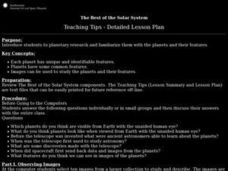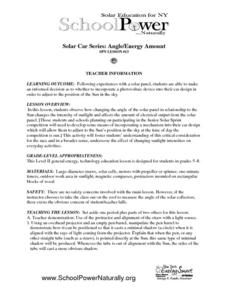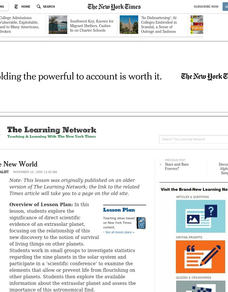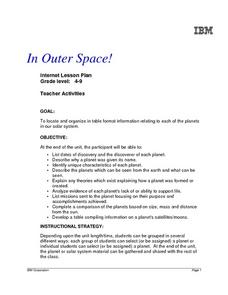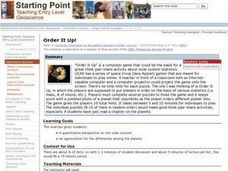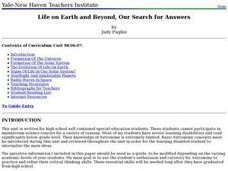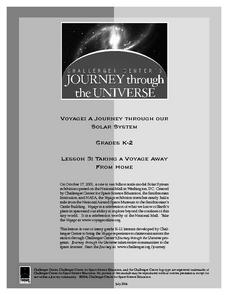Curated OER
Solar System: Fantasy Planet
Students create their own fantasy planet using computer software on KidPix. In this planets lesson plan, students also write a paragraph about their planet including the name, population, weather, and more.
Curated OER
The Best of the Solar System (Grades 6-8)
Learners are introduced to planetary research and become familiar with the planets and their features. They view images of the planets, and fill in an information chart which is imbedded in this plan.
Curated OER
Planets or Not, Here We Come!
Pupils, working in groups, research planets in terms of the size, temperature, number of moons, and potential for life. They use packets and worksheets as guides for their research. Students may role-play as aliens visiting their...
Curated OER
PLANETS IN PROPORTION
Students discover scales for both the solar bodies' relative sizes and their distances from the sun. They find equatorial circumference and volumes of their solar bodies. Students apply estimation strategies and proportioanl reasoning to...
Curated OER
Solar Car Series: Angle/Energy Amount
Does the angle of a solar panel change the output? Emerging engineers find out! Demonstrate for your class how they can angle a straw to match the angle of light rays coming from a source. Then turn them loose to experiment with the...
Curated OER
Paper Mache Solar System
Students make a model of the solar system. In this solar system lesson, students make paper mache models of the planets to hand in the classroom, measure the distance to each planet scaled with footsteps, and model the moon's movement...
Curated OER
A Whole New World
Young scholars work in small groups to investigate statistics regarding the solar system and participate in a 'scientific conference'. They explore available information about the extrasolar planet and assess the importance of this...
Curated OER
Voyage of Discovery
Students develop a sense of the scale of our solar system by creating a one to ten billion scale model. They calculate the relative sizes and distances for the planets and asteroid belt using a guiding worksheet. To create the model they...
Curated OER
The Solar Cycle
Students research the solar cycle. In this Science lesson, students use the internet to investigate the solar cycle. Students produce a spreadsheet and graph from the information collected.
Curated OER
Strange New Planet
Students simulate different spacecraft missions using materials provided. In this space science lesson, students observe and record a planetary model's features from a distance. They relate this activity to scientists' space exploration...
Curated OER
The Magic School Bus Lost in Space
Students identify the planets by making two models of the Solar System. They create a model that shows the order of the planets and a model that shows the planets sizes as compared to one another. They may write about the planet they...
Curated OER
In Outer Space
Students use the internet to gather information on the solar system. They identify the discoverer and unique characteristics of each planet. They compare and contrast each planet based on size, mass, and distance from the sun. They...
Curated OER
Quiz: Astronomy
In this science worksheet, 3rd graders will focus on various aspects of astronomy. Students will respond to ten questions all pertaining to stars, constellations, planets, and our solar system.
Curated OER
Reaching the Solar System
Students sing the Rap of the Solar System, view pictures of the planets, and calculate their weights and ages on all the planets and the sun. They create a presentation comparing themselves with a planet or object in the solar system.
Curated OER
Astronomy and Me: Moons Over New Haven
Third graders study the features of different moons orbiting the planets. In this astronomy lesson, 3rd graders explore the different phases of the moon using an interactive online website. They compare and contrast the features of the...
Curated OER
Planetary Profiles
Students explore the characteristics of the planets and moons in the solar system. They create profiles of the nine planets in the solar system and present a written and oral report about a planet.
Curated OER
Space - In Your Face or Not?
Second graders, in groups, examine how it doesn't matter if they can see the planets in the solar system or not--they're there.
Curated OER
Online Planetary Tour
Students develop an interactive presentation about the planets for their fictional interplanetary travel agency. They demonstrate their knowledge of internet research techniques and the Solar System through their interactive planetary...
Curated OER
Order It Up!
Students use the game "Order It Up" an activity about the solar system statistics. The teacher is in the front of a classroom with an Internet-capable computer and a computer projector projecting the game onto the screen. Students have...
Curated OER
Life on Earth and Beyond, Our Search for Answers
Students in a special education classroom are introduced to how the universe and solar system was formed. Using the internet, they research the characteristics of Earth that support human life. In groups, they compare and contrast...
Curated OER
Sun and Moon Folktale
Students become familiar with characteristics of folktales by reading or listening to African folktale that explains why sun and moon live in the sky. Students then create their own folktales about the sun and moon or another aspect of...
Curated OER
Taking a Voyage away from Home
Learners experience and participate in a journey through a "Voyage" exhibition of the Solar System and the frontier it covers. They build a dynamic model of the Earth and Sun. Descriptions are given on the relative sizes of the Sun and...
University of Colorado
Strange New Planet
The first remote sensors were people in hot air balloons taking photographs of Earth to make maps. Expose middle school learners to space exploration with the use of remote sensing. Groups explore and make observations of a new...
Scholastic
Lesson One: The Earth, Background and Glossary
How much do you really know about our planet? Middle schoolers build up their prior knowledge about Earth, its placement in the solar system, its composition, and important geological vocabulary with an introductory earth science lesson.

